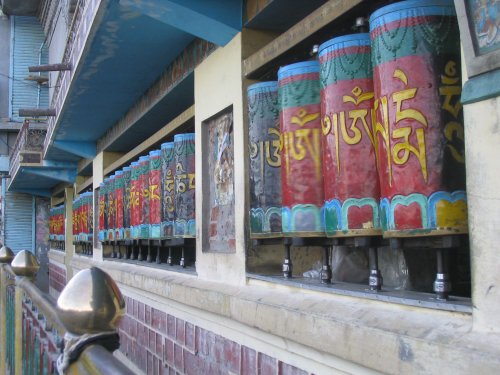 Dharamshala: In the hall of the Gu-Chu-Sum Ex-Political Prisoners' Association located in McLeod Ganj a lean, brisk Tibetan in his late thirties was getting comfortable on a plastic chair in front of the fidgeting audience. As Tsering Dhondup, a Tibetan refugee, started on the story of his imprisonment and final release, all whispers sank in a mute awareness from time to time broken by the appearing questions.
Dharamshala: In the hall of the Gu-Chu-Sum Ex-Political Prisoners' Association located in McLeod Ganj a lean, brisk Tibetan in his late thirties was getting comfortable on a plastic chair in front of the fidgeting audience. As Tsering Dhondup, a Tibetan refugee, started on the story of his imprisonment and final release, all whispers sank in a mute awareness from time to time broken by the appearing questions. According to Tsering Dhondup, he and his friend were arrested while shouting "Free Tibet!" at the Lhasa square in 1995. At that time he was twenty-two years old and belonged to a Buddhist monastery. "The protest was not spontaneous - we all were embarrassed by killings of Tibetans and destruction of Buddhist temples," he said, "monks were discussing it before, but not openly," he noted. After the fifteen-days trial Tsering Dhondup was committed to five years' imprisonment. Yet the punishment was not a surprise for him - before starting up the protest Tsering already knew what was going to follow.
The appointed term he spent in a small ward all empty but for the walls, ceiling, and a toilet hole in the floor. The day started at six in the morning and ended at ten in the evening - the prisoners were not allowed to sleep till the lights were off. The daily meals consisted of three small Tingmo (steamed bread) and a jar of hot water - terribly meager portions in those stringent conditions. "Every day we were given difficult physical exercises and if we failed the Chinese beat us," Tsering recalled in grim agitation - "We had to stay in the sun for hours and those with high blood pressure couldn't stand for a long time and fell unconscious, and then Chinese beat them."
 According to Tsering, their schedule also included obligatory studies in the theory of communism as well as Tibetan and Chinese history, which was all "a sheer brainwashing, since Chinese didn't want to recognize the Tibetan identity and constantly humiliated Tibetans. They told us about the sufferings of Chinese people from the Japanese army and said that we, Tibetans, don't know what suffering is in comparison to what the Chinese people have underwent." At that Tsering argued that the prisoners "were not against the Chinese government, they were not willing to destroy it, they were only fighting for the freedom of their country and their rights."
According to Tsering, their schedule also included obligatory studies in the theory of communism as well as Tibetan and Chinese history, which was all "a sheer brainwashing, since Chinese didn't want to recognize the Tibetan identity and constantly humiliated Tibetans. They told us about the sufferings of Chinese people from the Japanese army and said that we, Tibetans, don't know what suffering is in comparison to what the Chinese people have underwent." At that Tsering argued that the prisoners "were not against the Chinese government, they were not willing to destroy it, they were only fighting for the freedom of their country and their rights."
After the years of tortures, Tsering Dhondup was finally released in the year 2000, yet his miseries have not ended. He became avoided by most of his friends, because it happened so that the government had used to set up spies to look after the ex-political prisoners and those with whom they were connected. "Feeling deep inside that he cannot take the vows of a Buddhist monk again and come back to the monastery," Tsering started some small business in the countryside, which he ran till 2006, the time when he finally decided a flee to India through Nepal.
During his term Tsering couldn't communicate either with his friends or relatives, the only possibility he had was a once-a-year meeting with his parents that lived far from Lhasa. After his flee the situation didn't change - still the only possibility of contact with his past are rare calls and letters. Now Tsering Dhondup studies in the Gu-Chu-Sum center and is busy preparing for his exam that is going to happen one of the following days. "I do not regret my protest back in Lhasa, I knew what I was doing and was ready to face the consequences," stated he in firm assurance as the audience began wondering about his long way to freedom started back in Tibet.


![Tibet has a rich history as a sovereign nation until the 1950s when it was invaded by China. [Photo: File]](/images/stories/Pics-2024/March/Tibet-Nation-1940s.jpg#joomlaImage://local-images/stories/Pics-2024/March/Tibet-Nation-1940s.jpg?width=1489&height=878)

















